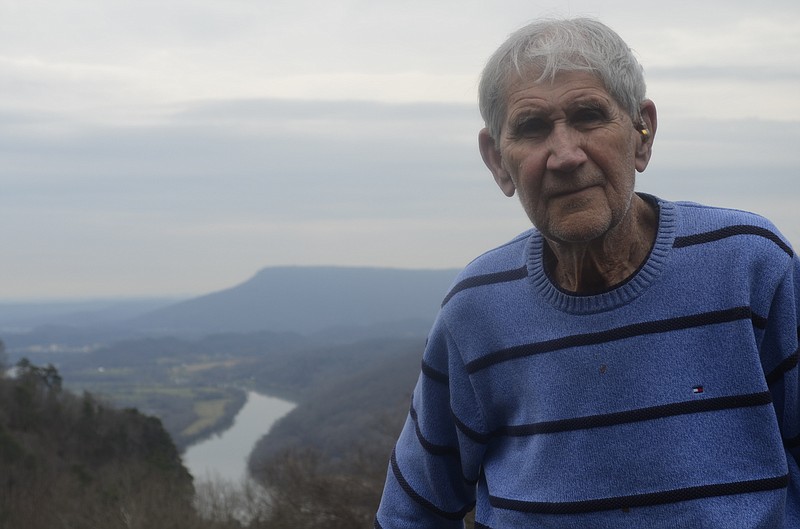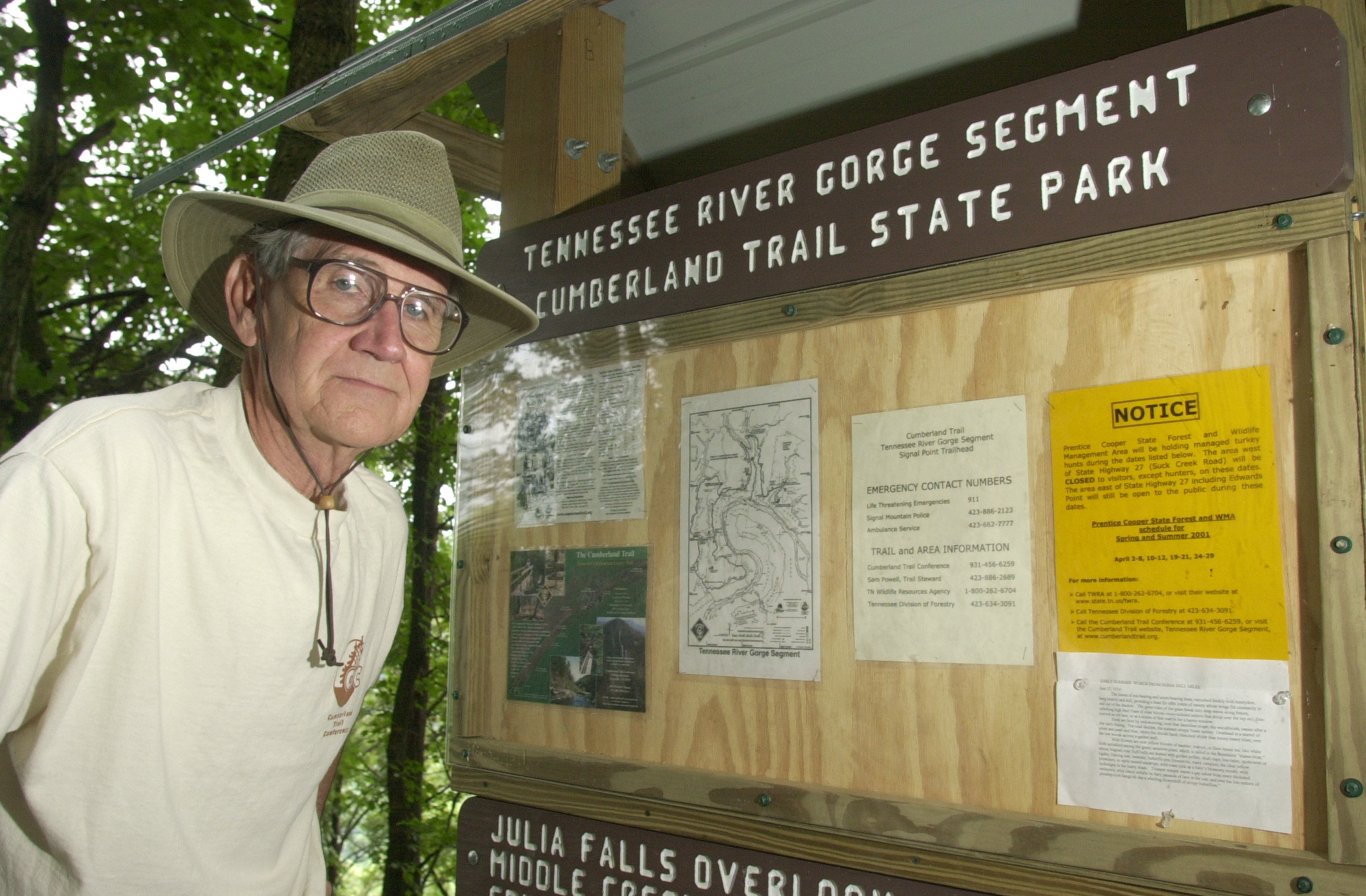For 50 years, Sam Powell has been building a legacy through the preservation of Chattanooga's green spaces. He is a founder of the Cumberland Trail and Tennessee River Gorge Trust. He helped build Shackleford Ridge County Park on Signal Mountain and was the first chairman of the Cumberland Trail Conference.
The 84-year-old says his late wife Emilie was his inspiration for everything.
Married for 62 years, Emilie was a writer, says Powell. Throughout her life, she worked as a reporter and editor. She published a biography, authored a novel and wrote several unpublished screenplays. She began her career as a columnist in Bedford County, Tennessee, where they were both raised.
Bedford County is a small Middle Tennessee community comprised of high elevation hills and flat river bottoms. The geography made it an ideal location for military exercises, also known as "war games." In the early 1940s, Powell remembers his hometown bustling with Armed Forces. Tanks rolled through the streets. Jets streaked the skies. As a young boy, Powell spent his summers eating lunch with soldiers in the forest behind his home.
And then one morning Powell awoke to find the woodlands behind his home empty.
"They had gone to invade Europe, see," he says.
Ten years later, Powell would be drafted into the Army. But first he had another mission: To make Emilie his wife.
In 1950, Powell graduated high school and began working for Duck River Electric as a groundman. Shortly thereafter, he took a job with Tennessee Valley Authority as a lineman. His job was to travel across west Tennessee building rural power lines. Before he left his hometown, he asked Emilie to go steady, but she turned him down.
"Well that tore me to pieces. I was helpless. But Emmy never went with anybody else," Powell says.
He returned home every weekend to court Emilie. During one visit, he tried to give her a ring. Again, she said no. Downtrodden, Powell returned to work. A few days later, a letter came to him. It was from Emilie and read, "I changed my mind. I don't want a ring. I just want to get married."
The couple wed the day before Thanksgiving in 1952. Shortly thereafter, Powell was drafted into the Army.
While Powell calls Emilie his inspiration, the Boy Scouts also influenced his life. Powell was an Eagle Scout, the highest rank possible in the Boy Scouts program. He spent his childhood earning merit badges in subjects such as first aid, cooking and orienteering. His commitment affected him in two important ways.
First, it helped determine his role in the military. Following basic training, Powell remembers most of his company was sent to Korea. Powell was left behind, along with a select few - all of whom were Eagle Scouts, he says. A commander told them, "We know the Eagle Scouts have a reputation of finishing what they start." And so, Powell was sent to leadership school in Augusta, Georgia, avoiding combat.
Secondly, through the Scouts, Powell developed a keen appreciation for maps. Every time he moved to a new city, he would study its road maps and topographic maps, learning important physical features of the land - knowledge that would later change the face of Chattanooga.
After the military, Powell attended the University of Tennessee on a GI Bill. He studied industrial management, which eventually landed him another job with TVA, this time as an engineer. The job was based in Chattanooga, and he and Emilie began to house hunt, to no avail. A Realtor finally suggested they build a home, directing them to look at an empty lot on Signal Mountain. It was 1960. Back then the mountain was less developed and more heavily wooded.
"Well I already knew every crook and cranny from studying the topo-map, see," says Powell. The first time he visited the property where his home now sits, Powell remembers picking his way through the brush until he came to a 30-foot bluff. Then he shimmied up a pine tree.
"I just wanted to see what I could see," he says.
What he saw took his breath away. Thousands of feet below, the steel blue river snaked through the steep valley; ridges rippled across the horizon.
He and Emilie purchased that wooded acre-sized plot for $7,000. There, they built a two-story split-level home, its north-facing wall made entirely of windows overlooking the Tennessee River Gorge. The couple began to put down roots. In 1967, Emilie gave birth to their daughter, Julia. Shortly thereafter, Powell helped start a Boy Scout troop at Signal Mountain's Wayside Presbyterian Church.
Around that same time, near Nashville, the first plans were being laid for the Cumberland Trail, a proposed 330-mile hiking trail along the eastern escarpment of Tennessee's Cumberland Plateau. The Tennessee Trails Association formed in 1975 to help bolster the proposed footpath. Powell was contacted to help raise awareness for its southern trailhead. He was an ideal candidate. After years of studying maps, he knew Signal Mountain's ridges and gullies like he knew his own skin. As an Eagle Scout, he knew a trail should follow a land's natural contour lines. And he had more than mapping experience. He also had manpower. Soon, the Cumberland Trail became an ongoing project for his Scout troop.
Today, 190 miles have been completed, with the northern terminus in Cumberland Gap National Historical Park and the southern terminus at Signal Point, part of the Chickamauga-Chattanooga National Military Park, on Signal Mountain.
His trail work led to a number of other ventures. For instance, Powell helped found the Cumberland Trail Conference, a sister project of the Tennessee Trails Association, to raise funds for the trail. Then he became its first chairman - thanks to Emilie.
"So [Bob Brown]* calls down to talk to me and I wasn't home. He talked to Emilie and said, 'I'd like Sam to be chairman.' Emilie said, 'Yeah, he'll do it.' Well I came home and she told me and I said, 'Wait a minute!' But that's getting back to our sweet-heartness. We were like this," Powell says, crossing his fingers as he holds them up to explain.
While promoting the trail, he met landowners like Adele Hampton, who were also interested in protecting Chattanooga's natural landscape. In 1981, Hampton, Powell and several others founded the Tennessee River Gorge Trust, which has since protected over 17,000 acres of the river gorge.
Over the decades, Powell has served on countless boards and commissions, including the Signal Mountain Parks Board, Tennessee River Gorge Trust and the Tennessee Conservation Committee. He developed outdoor classrooms for Signal Mountain students and a trail system at Shackleford Ridge County Park - the road to which was named in his honor: Sam Powell Trail.
Powell keeps a copy of the street sign on a bookshelf in his well-lived-in home. His tables are stacked with old photographs. His walls are covered with newspaper clippings and awards that chronicle his lifetime achievements. But, he says, there is still more he hopes to accomplish.
He points out his window, down to the gorge. There is a plot of land he has purchased where he'd like to build an amphitheater. Someday, he says, he wants to bring Emilie's plays to life, beginning with one titled River of Death. It tells the story of Cherokee chief Dragging Canoe, who spent his life protecting his ancestral lands and who finally died from exhaustion in 1792.
"He was a great warrior," says Powell. "He fought to the very last minute."
* Bob Brown was a founder of the Tennessee Trails Association

